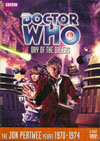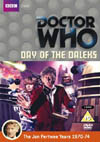DVD features (on 2 discs no less) include:
"Day of the Daleks" however is a bit of an exception. It has by far the most intriguing plot of any Pertwee Dalek story, and is largely a success because of it. The producers actually grafted the Daleks onto its good script at the last minute, which was a logical move on their part that should have worked. As far as the 1972 version is concerned though, the Daleks themselves turned out to be the weakest part of the production, both poorly directed and poorly voiced. All that has changed though, thanks to a new 2011 version released alongside the original on the story's DVD. In fact, this is perhaps a rare case where the new version can take over from the original as THE definitive version of this story. I don't say this lightly, as my reviews of the Fiona Cumming remakes "Enlightenment" and "Planet of Fire" can attest to. The new "Day of the Daleks" has been able to turn the tables on the production, and breathe new life into what was essentially a fascinating story. At last, Jon Pertwee finally has a truly worthy, exciting adventure with the show's most infamous villains.
Daleks in ProductionThe original 1972 TV version was quite disappointing, after my expectations were raised by encountering the novelization first. Paul Bernard managed to deliver a mostly adequate directing job, but the results left much to be desired. Both the action sequences and the Daleks suffered the most. Many scenes were just not blocked out well enough to be believable, or in some cases left the audience confused when they should be emotionally engaged.Once again, the leading Dalek got the frailest sounding "Granny" voice and too much unnatural pausing between syllables. The Daleks' TV adventures had just moved into colour, meaning the old full screen negative effect for their weapons' blast looked really outdated. Far from making any improvements in 1972, we got it in slow motion with hammy acting from the victims, making it absurdly silly.
Dudley Simpson's music is not great this time around, not composed well enough to elicit much emotion from the audience, and not performed on a great choice of instruments either, electronic or otherwise. But at least it is somewhat thematic and therefore, somewhat memorable. Even if it doesn't make the greatest first impression, it definitely can grow on you after a while.
2011 Special Edition VersionNow, most of the above problems have indeed been tackled by the Special Edition's production team and thoroughly improved and brought up to a decent, enjoyable, often quite exciting level. First of all, our special edition is four episodes, with cliffhangers, and with pretty much every dialogue scene played out at full length, meaning that they have maintained the strengths of the original. Pretty much everything they've changed is simply an improvement on the competence of the original directing and editing, and it pays off in spades whenever there is an action scene, and nearly always whenever Daleks appear as well. Good stuff.All futuristic weapons now feature excellent on-screen laser beams, and a thoroughly improved extermination effect for the Daleks. Full marks. Nicholas Briggs' voices rule, allowing us to take the Daleks seriously again when they appear on screen. Two thumbs way up! And there are now many shots of additional blue Daleks cut in when we need the hordes. Add all that to the improved editing for the action sequences, and the case for preferring the new version becomes nearly open and shut. Not everything is totally successful, but the few minor detractions are extremely minor when compared to the faults of the original. There's a new disintegration effect in this story, which is a bit gross for my tastes. We also get some new shots of futuristic buildings, which are kind of cool, but I still miss the old shots, which previously evoked that lonely abandoned quality that Rod Serling championed and used to make so many episodes of "The Twilight Zone" so creepy. If there's one effect that the old version did better, I think it is the various comings and goings through time. The new version features an extra sphere of light with orbiting light patterns and smoke effects, on top of the old rings of feedback pulses. Simply put, it too easily obscures and distracts us from noticing the face of the time traveler, or the fact that he/she is appearing or disappearing, and story points are in danger of being lost. The new effect is cool and works some of the time, but the old effect from 1972 was also cool and ALWAYS worked for the story. This is one element I would have left largely as is.
Story Threads"Day of the Daleks" still works and remains entertaining and relevant today thanks to its story, as it delves deep into paradoxes of time-travel and patterns of government corruption. The paradox of the Doctor and Jo meeting themselves in their lab can really only be enjoyed for whatever humour one can find in it; the scene at the beginning doesn't make much sense all on its own, and the scene at the very end that would have completed it got cut out due to time restraints on the fourth episode. A true pity, as episodes one and two do seem a bit padded by contrast; a little restructuring might have allowed all the goodies to be fitted in. Even so, in the episodic version, waiting three weeks to get an explanation for a scene would have been a questionable move anyway."Day of the Daleks" gets good and interesting by episode three. The old prisoner dynamic pops up, but is kept to the barest of minimums, only used as a vehicle for exposition of a few important human characters of the era.
Time ParadoxThe final temporal paradox takes the cake though, as it was meant to, and interestingly enough, it can be completely understood even from watching only the final episode, in which it is finally discovered and explored. All the kidding aside, "Blinovitch Limitation Effect" included, I have been so opinionated on what is and isn't possible in time travel that I must give "Day of the Daleks" its due as well.I will give the temporal paradox here the same nod of approval that I give to the eighth Star Trek feature film "First Contact", which is that the events we see are all technically okay, while the characters are allowed to have incorrect theories about what is going on. In fact, "Day of the Daleks" holds up a bit better, because there really is no Commander Data babbling away the wrong idea to the audience unobstructed. Here it is interesting to note that the Doctor appears to have embraced what he learned in "Inferno" (story no. 54), that an infinity of parallel/branching timelines exists, allowing free will, and to use his own words, "the pattern can be changed". (In my own words, it is important to say "the pattern can be chosen" instead, as none of the various timeline options actually change.) Anyway, gone is the old conviction of not being able to affect outcomes that plagued the Doctor in the Hartnell era, in stories like "The Aztecs" (story no. 6) and "The Massacre" (story no. 22), and the Doctor is definitely a more enjoyable and heroic character here as a result. An added bonus here is that the metaphysical aspects of people creating their own reality is made very tangible as well. Beautiful touch. There is much more to say about the elegance of the resolution of "Day of the Daleks", plus a few notes on things that most viewers won't realize are still left unresolved, but we'll save most of that for the in-depth analysis version of this review.
Fiction Mirroring Fact???In her interview in Doctor Who Magazine, issue 199, actress Ingrid Pitt (Queen Galleia in "The Time Monster" [story no. 64] and Dr. Solow in "Warriors of the Deep" [story no. 131] ) reported that she and her husband had been commissioned to write a Doctor Who story set on the USS Eldridge during The Philadelphia Experiment, partly inspired by the book by Charles Berlitz, and the story went up the spout when the original season 23 was cancelled in favour of a hiatus. No self-respecting fan of Doctor Who and time travel in general should go without doing some research into this experiment, and the technology that resulted from it.Some reports indicate that it could have led to an attempt at something that mirrors the plot of "Day of the Daleks", and thus might be an interesting read for Doctor Who fans. But since we assume you're reading this version of our review to avoid spoilers, we'll save that discussion for the in-depth analysis version of our review and the extensive "Philadelphia Experiment" article elsewhere on our site.
This story is available on VHS video, and now DVD with optional new CGI effects and voice-overs. Click on the Amazon symbol for the location nearest you for pricing and availability:
Comments on this article are welcome. You may contact the author from this page:
|








